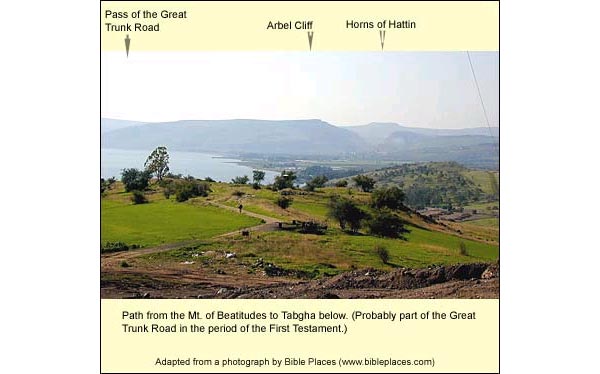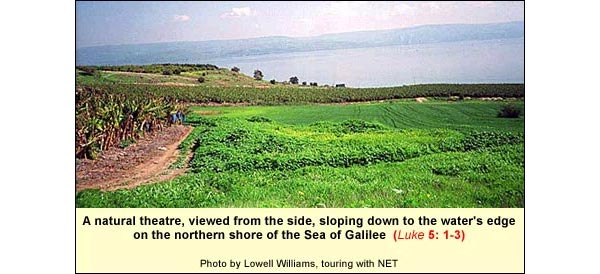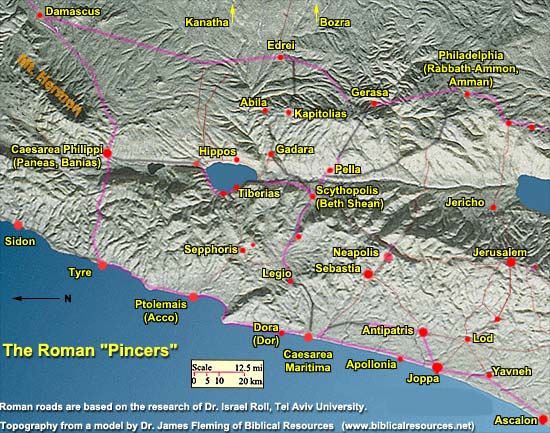Mt. of Beatitudes

ModestShoulders covered, legs covered below the knees dress required.
Opening hours: 8.00 - 11:45, 14.30 - 17.00 in summer, 16.00 in winter. Phone: 04-6711200. {mospagebreak title=A Walk } The Mount of Beatitudes: A Walk Down the Mountain
At any daylight hour, one may walk down the hill to the area of Tabgha, following a rough dirt path. Good walking shoes are a must. In hot weather: have water, a hat and both hands free. After a rain, don't try it. There is a fence down below, and the gate may be locked, necessitating a wide detour to the east.
In making this walk, we are probably on a piece of the Great Trunk Road from the First Testament period, before the Romans bridged the mouth of the Upper Jordan. This later became a local road joining the shore with Chorazin above us. Jesus probably used it often. Halfway down the path, looking slightly to the east, we can see how the landscape formed a natural theatre for anyone addressing a multitude from the shore (see, for example, Luke 5:1-11).

{mospagebreak title=Sermon and Covenant} The Covenant Faith and the Sermon Viewing the Lake of Galilee from the Mt. of Beatitudes, we may try to imagine what was in the minds of the Jewish fishermen 2000 years ago, before they encountered Jesus. On the one hand, they had the Jewish covenant faith, as enunciated in Deuteronomy 11: 13-17
It shall happen, if you shall listen diligently to my commandments which I command you this day, to love Yahweh your God, and to serve him with all your heart and with all your soul, that I will give the rain of your land in its season, the former rain and the latter rain, that you may gather in your grain, and your new wine, and your oil. I will give grass in your fields for your livestock, and you shall eat and be full. Take heed to yourselves, lest your heart be deceived, and you turn aside, and serve other gods, and worship them; and the anger of Yahweh be kindled against you, and he shut up the sky, so that there shall be no rain, and the land shall not yield its fruit; and you perish quickly from off the good land which Yahweh gives you.
These words appear often in Jewish ritual. Pious Jews recite them twice a day. A scribe writes them on a small piece of parchment, which is placed in a container and nailed to the doorpost of the house. The Hebrew for doorpost is mezuzah, and the parchment got that name.
The covenant as it appears in Deuteronomy 11 is the first written statement of the notion that God rewards the good and punishes the wicked. Its classic illustration (including background for understanding much of what follows) appears in the account of Elijah's confrontation with the prophets of Baal on Mt. Carmel.
Such was God's covenant with Israel as the Jewish fishermen on the lake understood it 2000 years ago. That would have been in their minds.
Something else too was in their minds: what they saw around them. Through their control of the roads, the Romans had the land in a pincers:

The fishermen saw Hippos and Gadera: two cities of the Decapolis,Decapolis. A league of cities under Roman auspices. Sometimes ten are mentioned, sometimes more. According to Josephus (War: 3, 446), the biggest was Scythopolis (Beth Shean). It was the key link city west of the Jordan, whereas the others were east of the river. They included Damascus (an honorary member), Hippos, Gadera, Gerasa (Jerash), Pella and Philadelphia (Amman). Other cities were later added to the original ten. In the first century AD, however, no coins minted in these cities mention a Decapolis. Matthew (4:25) and Mark (5:20, 7:31) write of Jesus' passing through it, but they may have been using a term first current in their own time. All other historical references to the league date from after the outbreak of the Jewish revolt in 66 AD. (See Anson F. Rainey and R. Steven Notley , The Sacred Bridge, Jerusalem, Carta, 2006, pp. 361-362). once under Jewish sovereignty, now dominated by Rome. In the Jordan Valley to the south lay Scythopolis (a.k.a. Beth Shean), patronized by Dionysus. On the lake itself were Tiberias, Magdala and Bethsaida (see map below); these were "mixed" cities, pagan and Jewish. Farther west was Sepphoris, with its cult of Dionysus, and beyond it Ptolemais (Acco), dedicated to Zeus-Jupiter, not to mention Caesarea Maritima, dominated by the divine Augustus. Rome, in short, was everywhere.
On the one hand, then, the fisherman had their covenant faith, and on the other hand, here was Rome. These two things stood in apparent contradiction.
Foreign conquest and the covenant faith hadn't always been in contradiction. In earlier times of suffering (say, when the Assyrians conquered the northern kingdom called "Israel," or when the Babylonians took Jerusalem) the pain could be seen as God's just punishment, because the people had not kept the covenant. But when the Jews returned from their Babylonian exile (530 BC), they had learned their lesson: they no longer worshipped foreign gods. This was even more purely the case after the successful HasmoneanThe Hasmoneans: family of Judah Maccabee ("the hammer") and his brothers, who revolted successfully against the Greek Empire in 167 BC. They purified and re-dedicated the Temple in Jerusalem, establishing the festival of Hanukah ("dedication"). They ruled till 63 BC, and their domain extended almost as far as King David's. revolt against the Greeks. So the question arose: Why are we not sovereign in our own land? Why do we not have the place among the nations that God promised us? Why are we in the Roman pincers?
The question had an economic side. The fishermen, as well as the peasants, were kept at a mere subsistence level by the Roman emperor, his client (in Galilee that was Tetrarch Herod Antipas), the urban aristocrats, the tax collectors and the brokers (who sold, for example, fishing licenses). (More...)
Why the Roman pincers? Confronted with this problem, religious Jews did then what they have always done: they searched the Bible for an answer.
They found it in Micah 5:
But you, Bethlehem Ephrathah,

Yet what if some prophet or rabbi were to come along and change the definition of idolatry? What if it was no longer a question of Baal or Asherah, but rather the idols of the heart? Could one then claim to be fulfilling the covenant? The re-definition of idolatry is a large part of what I believe is going on in the Sermon on the Mount. The idol that Jesus identifies is the human ego in its tendency to put itself first. He wasn't alone: other rabbis too turned the lens of iconoclasm upon the human heart. Jesus is distinct, however, in at least two respects. First, he carries his critique of self-idolatry to an uncompromising conclusion, more radical than anything in the rabbinic literature. Second, he calls upon his disciples to be a community living in accordance with this iconoclasm, a Messianic community ("the kingdom of God"), capable of thriving and increasing regardless of what Rome does. That is the point (or one of the points) behind the teaching to turn the other cheek, walk two miles when required, love your enemy, and not fret about what tomorrow may bring.Matthew 5:38-42“You have heard that it was said, ‘An eye for an eye, and a tooth for a tooth.’ But I say to you, do not resist an evil person; but whoever slaps you on your right cheek, turn the other to him also. If anyone wants to sue you and take your shirt, let him have your coat also. Whoever forces you to go one mile, go with him two. Give to him who asks of you, and do not turn away from him who wants to borrow from you.” By re-defining idolatry, Jesus undermines the challenge to the covenant faith. On the other hand, he does address the problem of Roman dominion -- by taking the issue to a deeper level, where Rome is powerless. It is in this light that the beatitudes have their resonance:
Matthew 5: 1-10 When Jesus saw the crowds, He went up on the mountain; and after He sat down, His disciples came to Him. He opened His mouth and began to teach them, saying, Blessed are the poor in spirit, for theirs is the Kingdom of Heaven. Blessed are those who mourn, for they shall be comforted. Blessed are the gentle, for they shall inherit the earth. Blessed are those who hunger and thirst after righteousness, for they shall be filled. Blessed are the merciful, for they shall obtain mercy. Blessed are the pure in heart, for they shall see God. Blessed are the peacemakers, for they shall be called children of God. Blessed are those who have been persecuted for righteousness’ sake, for theirs is the Kingdom of Heaven. These blessings are spoken before the disciples, who are to be "the salt of the earth" (5:13), "the light of the world" (5:14). Then we find this (v.20): For I tell you that unless your righteousness exceeds that of the scribes and Pharisees, there is no way you will enter into the Kingdom of Heaven. What sort of righteousness is this to be, without which I am excluded from the kingdom? At once we get an indication (vs.21-22): You have heard that it was said to the ancient ones, ‘You shall not murder;’ and ‘Whoever shall murder shall be in danger of the judgment.’ But I tell you, that everyone who is angry with his brother shall be in danger of the judgment. Under Mosaic law, it is permissible for me to be angry with another person, as long as I do not carry my impulse into harmful action (in other words, as long as I control myself). Mosaic law allows for a division of the self between impulse and action. Jesus ("But I say to you...") allows no such division. I am to be "pure in heart." This comes to expression again in the famous teaching about adultery (5:27-28): You have heard that it was said, 'You shall not commit adultery'; but I say to you that everyone who looks at a woman with lust for her has already committed adultery with her in his heart. I think there is a recognition here of a basic psychological postulate: as long as part of my effort must go toward suppressing my own impulses, I do not have full energy for my relations with those outside me: I am not fully there for anyone or anything; I am not fully present in the lived moment, or in other words, not fully living the life that is given me. Jesus, on the other hand, presents us with the example of a person who is fully there: all of his energy goes out toward others as love (5:43-45): You have heard that it was said, ‘You shall love your neighbor,* and hate your enemy. But I tell you, love your enemies, bless those who curse you, do good to those who hate you, and pray for those who mistreat you and persecute you, that you may be children of your Father who is in heaven. For he makes his sun to rise on the evil and the good, and sends rain on the just and the unjust. Such a person reserves no ray of attention for himself. There is no self-idolatry, hence no impulse to suppress. The question arises, How can I get from my present divided condition to the wholeness and purity that he is talking about? What is the way to life? That question points us toward Jerusalem, where he walked a way: the Way of the Cross.